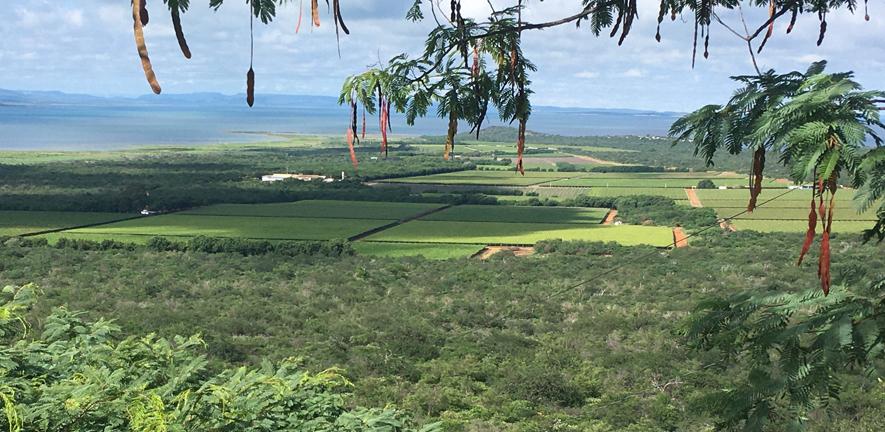
We are interested in understanding ecological processes and functions in agricultural ecosystems, and in conserving wild species that live within and around these working landscapes.
In our field studies, we use a range of methods, including genetics, remote sensing, audio-recording, experimental and observational field ecology and network analysis. We work mostly on animal taxa that are functionally important in the system, particularly wild pollinators (especially bees), predatory invertebrates, and birds.
Our research is trans-disciplinary - challenge-led, inter-disciplinary, and co-produced with a range of non-academic stakeholders. We use survey methods and participatory techniques to involve farmers, industry and other stakeholders from the outset, and we follow ‘user-centered design’ approaches to build decision support tools based on evidence.
Current research projects include:
- Healthy Soil, Healthy Food, Healthy People (H3): evaluating the effects of a transition to regenerative agriculture on soils, biodiversity, ecosystem services and food quality.
- Global Insect Threat Response Synthesis (GLiTRS): a comprehensive and predictive assessment of the pattern and consequences of insect decline.
- Mandala – Transforming Urban Food Systems. Compiling data and evidence on the environmental impacts of food consumed in UK cities.
- Building user-friendly models to support sustainable farm management decisions, including the Cool Farm Biodiversity Tool
- Developing methods to bridge the gaps between policy, practice and scientific knowledge on biodiversity, in collaboration with Conservation Evidence and Eklipse
- Studying impacts of agricultural intensification on biodiversity and ecosystem services on fruit farms in the Brazilian caatinga, funded by the SUFICA project
- Translating scientific knowledge into usable, accessible tools to inform decisions that impact pollinators across multiple sectors as part of RestPoll – a transdisciplinary project aiming to provide society with tools to reverse wild pollinator declines and to position Europe as a global leader in pollinator restoration.
- Assessing the use of landscape and impacts of management on bumblebees, in partnership with the Bumblebee Conservation Trust
- We are part of the Centre for Landscape Regeneration: providing knowledge and tools to regenerate British countryside using cost-effective nature-based solutions. Our group leads work on biodiversity monitoring at field scale, incorporating new genetic and acoustic technologies.
Key Publications:
Zielonka, N. B., Arellano, E., Crowther, L. P., Ferreira, V., Muñoz-Sáez, A., Oliveira-Rebouças, P., . . . Dicks, L. V. (2024). Distinct bird communities in forests and fruit farms of Caatinga landscapes. Ibis, https://doi.org/10.1111/ibi.13311
Beacham, J. D., Jackson, P., Jaworski, C. C., Krzywoszynska, A. & Dicks, L. V.(2023). Contextualising farmer perspectives on regenerative agriculture: A post-productivist future? Journal of Rural Studies 102, 103100.
DOI: https://doi.org/10.1016/j.jrurstud.2023.103100
Blüthgen N., Dicks L.V., Forister M.L., C.L., O., & E.M., S. (2023). Insect declines in the Anthropocene. Nature Reviews Earth and Environment. https://doi.org/10.1038/s43017-023-00478-x
Jaworski, C. C., Krzywoszynska, A., Leake, J. R., & Dicks, L. V. (2023). Sustainable soil management in the United Kingdom: A survey of current practices and how they relate to the principles of regenerative agriculture. Soil Use and Management. doi:10.1111/sum.12908
Luke, S. H., Roy, H. E., Thomas, C. D., Tilley, L. A. N., Ward, S., Watt, A., . . . Dicks, L. V. (2023). Grand challenges in entomology: Priorities for action in the coming decades. Insect Conservation and Diversity, 16(2), 173-189. https://doi.org/10.1111/icad.12637
Ryan, I. C., Shutt, J. D., & Dicks, L. V. (2023). The importance of multi-year studies and commercial yield metrics in measuring pollinator dependence ratios: A case study in UK raspberries Rubus idaeus L. Ecology and Evolution, 13(5), e10044. https://doi.org/10.1002/ece3.10044
Sharps E, Hawkes RW, Bladon AJ, Buckingham DL, Border J, Morris AJ, Grice PV & Peach WJ (2023) Reversing declines in farmland birds: How much agri-environment provision is needed at farm and landscape scales? Journal of Applied Ecology https://doi.org/10.1111/1365-2664.14338
Stout, J. C., & Dicks, L. V. (2022). From science to society: implementing effective strategies to improve wild pollinator health. Philosophical Transactions of the Royal Society B: Biological Sciences, 377(1853), 20210165. https://doi.org/10.1098/rstb.2021.0165
Barnsley, S. L., Lovett, A. A., & Dicks, L. V. (2022). Mapping nectar-rich pollinator floral resources using airborne multispectral imagery. Journal of Environmental Management, 313, 114942. https://doi.org/10.1016/j.jenvman.2022.114942
Dicks, L. V., Breeze, T. D., Ngo, H. T., Senapathi, D., An, J., Aizen, M. A., . . . Potts, S. G. (2021). A global-scale expert assessment of drivers and risks associated with pollinator decline. Nature Ecology & Evolution, 5, 1453-1461. doi:10.1038/s41559-021-01534-9
Cole, L. J., Kleijn, D., Dicks, L. V., Stout, J. C., Potts, S. G., Albrecht, M., ... Scheper, J. (2020). A critical analysis of the potential for EU Common Agricultural Policy measures to support wild pollinators on farmland. Journal of Applied Ecology. doi:10.1111/1365-2664.13572
Egan, P., Dicks, L. V., Hokkanen, H., & Stenberg, J. (2020). Delivering integrated pest and pollinator management. Trends in Plant Science. https://doi.org/10.1016/j.tplants.2020.01.006
Shackelford GE, Kelsey R & Dicks, LV. (2019) Effects of cover crops on multiple ecosystem services: Ten meta-analyses of data from arable farmland in California and the Mediterranean. Land Use Policy, 88: 104204.
Garibaldi LA, Pérez-Méndez N, Garratt MPD, Gemmill-Herren B, Miguez FE, Dicks LV. (2019) Policies for Ecological Intensification of Crop Production. Trends Ecol Evol. 34: 282-286
Rose DC, Sutherland WJ, Parker C, Lobley M, Winter M, Morris C, Twining S, Ffoulkes C, Amano T, Dicks L V (2016) Decision support tools for agriculture: Towards effective design and delivery. Agricultural Systems 149: 165-174.
Dicks, L.V., Viana, B., Bommarco, R., Brosi, B., Arizmendi, M.D.C., Cunningham, S.A., Galetto, L., Hill, R., Lopes, A.V., Pires, C., Taki, H., Potts, S.G. (2016) Ten policies for pollinators. Science 354, 975-976.
